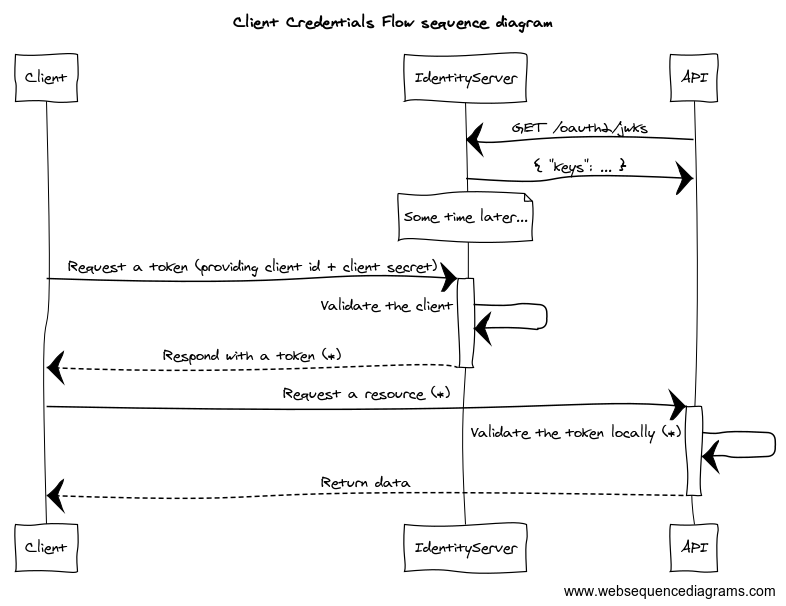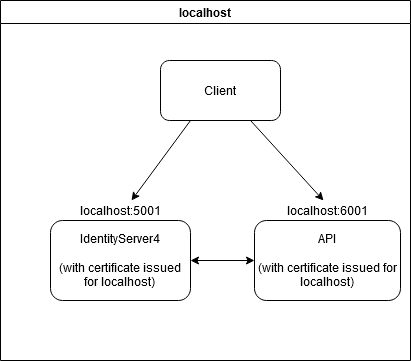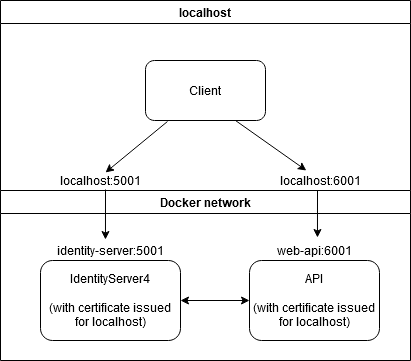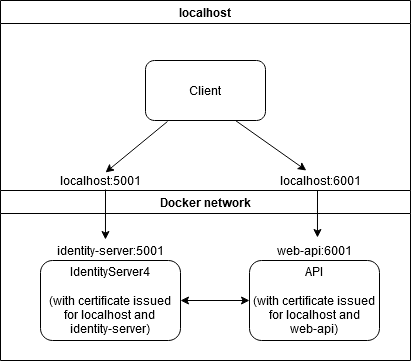Securing an API while running IdentityServer4 on Docker with HTTPS enabled locally
Recently I’ve been trying to spin up an instance of IdentityServer4 which would protect an example API with Client Credentials Flow - just to get my head around it.
What I wanted to achieve:
- communication between services should work the same way locally as in production (hence, it should be secure - going through HTTPS)
- services should be Dockerised so that the developer setup is as easy as possible (I also wanted to try out the new Docker Desktop with WSL 2 integration finally available for Windows Home users)
The easiest way to start with IdentityServer4 is to go through the official quickstart tutorial, but even though the examples leverage HTTPS, putting it into Docker turned out to be way much trickier than I initially expected. I’m not the first one who has run into this issue (for instance see here, here or here. Or here. Or here…), but I couldn’t find any fully working reproducible solution/explanation on the Internet, so here’s the post.
The localhost’s gone!
We’ve got 3 services involved:
- IdentityServer4 (aka Identity Provider)
- API
- Client (user of the API)
You’ve probably seen the diagram describing communication between these services (or some version of it) if you’ve already worked with Client Credentials Flow:

First of all - the API service needs to retrieve the JSON Web Key Set (JWK Set) from the Identity Provider so that it can validate JWT tokens locally without the need to call the Identity Provider with every request (which is a huge advantage of using JWT tokens). This might happen either on service startup or with a first incoming request.
Later, in order for the Client to be able to retrieve a resource from the API, first it needs to obtain a valid access token (shown as (*) in the above diagram) from the Identity Provider that’s trusted by the API.
When you’re just running these services on your host machine, they all refer to each other by localhost addresses:

The moment you put IdentityServer and API in the Docker container and spin up both of these using docker-compose, by default a new network is created. The new network is separate from your localhost. From your host machine you can still refer to these services as localhost, but within the Docker network services need to use container names (identity-server and web-api in this specific scenario) to speak to each other:

First attempt - using dotnet dev-certs tool
It’s all hunky-dory when you’re using HTTP for cross-service communication (we don’t want that), but not when certificates come into play.
Microsoft docs describe how to use HTTPS in Docker Compose but that doesn’t work when services need to refer to each other by anything else than localhost, since dev certificates that are accessed with dotnet dev-certs tool are issued for localhost only:

Running a variation of this command: dotnet dev-certs https -ep %USERPROFILE%\.aspnet\https\aspnetapp.pfx -p password (see Microsoft docs link above for details) will export a .pfx certificate. You then need to put it in your Docker container and redirect Kestrel to use it. After setting up environment variables your docker-compose could look something along these lines:
version: "3"
services:
identity-server:
build: ./src/IdentityServer
ports:
- "5001:5001"
volumes:
- ./src/IdentityServer:/root/IdentityServer:cached
- ${USERPROFILE}/.aspnet/https:/https/
environment:
- ASPNETCORE_URLS="https://+;"
- ASPNETCORE_HTTPS_PORT=5001
- ASPNETCORE_Kestrel__Certificates__Default__Password=password
- ASPNETCORE_Kestrel__Certificates__Default__Path=/https/aspnetapp.pfx
web-api:
build: ./src/Api
ports:
- "6001:6001"
volumes:
- ./src/Api:/root/Api:cached
- ${USERPROFILE}/.aspnet/https:/https/
environment:
- ASPNETCORE_URLS="https://+;"
- ASPNETCORE_HTTPS_PORT=6001
- ASPNETCORE_Kestrel__Certificates__Default__Password=password
- ASPNETCORE_Kestrel__Certificates__Default__Path=/https/aspnetapp.pfx
Unfortunately, it’s going to work only as long as these Docker services won’t start calling each other. You will run into a certificate validation issues when the API tries to securely connect to the IdentityServer to pull the JWK Set mentioned above (if you’re lost - refer back to the Client Credentials Flow diagram at the top of this post). Even though the client connects to localhost (see the network diagram above) - API and IdentityServer need to refer to each other as identity-service and web-api respectively (those are the container names defined in docker-compose). The API won’t be able to reach IdentityServer under localhost:5001 anymore, and when it tries to connect to identity-service:5001 the certificate validation fails, since the certificate wasn’t issued for identity-service, but for localhost!
Another problem is the name of the issuer (the Authority setting in the API configuration). By default IdentityServer sees itself as localhost:5001 and when you run it and retrieve the discovery endpoint ([https://localhost:5001/.well-known/openid-configuration]) it will respond with a JSON with issuer value being equal to https://localhost:5001. But when the API calls the IdentityServer to check if the token is valid, by default it checks if the URL of the identity provider (https://identity-service:5001) is the same as the name of the token issuer that’s extracted from the token (https://localhost:5001) - which is not the case!
It is cert to work now!
To make it work nicely, we have to manually issue certificates, so that API service doesn’t run into certificate validation issues when calling IdentityServer:

First we need to issue the certificate with CN (Common Name, also known as Fully Qualified Domain Name (FQDN)) having entries for both identity-server and localhost for IdentityServer, and web-api and localhost for the API. I’ve done it this way by issuing a self-signed root CA certificate which is then used to sign certificates for both IdentityServer and API using New-SelfSignedCertificate and then exported with Export-PfxCertificate and Export-Certificate:
$testRootCA = New-SelfSignedCertificate -Subject $rootCN -KeyUsageProperty Sign -KeyUsage CertSign -CertStoreLocation Cert:\LocalMachine\My
$identityServerCert = New-SelfSignedCertificate -DnsName $identityServerCNs -Signer $testRootCA -CertStoreLocation Cert:\LocalMachine\My
$webApiCert = New-SelfSignedCertificate -DnsName $webApiCNs -Signer $testRootCA -CertStoreLocation Cert:\LocalMachine\My
$password = ConvertTo-SecureString -String "password" -Force -AsPlainText
$rootCertPathPfx = "certs"
$identityServerCertPath = "src/IdentityServer/certs"
$webApiCertPath = "src/Api/certs"
Export-PfxCertificate -Cert $testRootCA -FilePath "$rootCertPathPfx/aspnetapp-root-cert.pfx" -Password $password | Out-Null
Export-PfxCertificate -Cert $identityServerCert -FilePath "$identityServerCertPath/aspnetapp-identity-server.pfx" -Password $password | Out-Null
Export-PfxCertificate -Cert $webApiCert -FilePath "$webApiCertPath/aspnetapp-web-api.pfx" -Password $password | Out-Null
# Export .cer to be converted to .crt to be trusted within the Docker container.
$rootCertPathCer = "certs/aspnetapp-root-cert.cer"
Export-Certificate -Cert $testRootCA -FilePath $rootCertPathCer -Type CERT | Out-Null
# Trust it on your host machine.
$store = New-Object System.Security.Cryptography.X509Certificates.X509Store "Root","LocalMachine"
$store.Open("ReadWrite")
$store.Add($testRootCA)
$store.Close()
We need to orchestrate docker-compose to put these certificates in containers and set up environment variables correctly:
version: "3"
services:
identity-server:
build: ./src/IdentityServer
ports:
- "5001:5001"
volumes:
- ./src/IdentityServer:/root/IdentityServer:cached
- ./src/IdentityServer/certs:/https/
- type: bind # Using a bind volume as only this single file from `certs` directory should end up in the container.
source: ./certs/aspnetapp-root-cert.cer
target: /https-root/aspnetapp-root-cert.cer
environment:
- ASPNETCORE_URLS="https://+;"
- ASPNETCORE_HTTPS_PORT=5001
- ASPNETCORE_Kestrel__Certificates__Default__Password=password
- ASPNETCORE_Kestrel__Certificates__Default__Path=/https/aspnetapp-identity-server.pfx
web-api:
build: ./src/Api
ports:
- "6001:6001"
volumes:
- ./src/Api:/root/Api:cached
- ./src/Api/certs:/https/
- type: bind # Using a bind volume as only this single file from `certs` directory should end up in the container.
source: ./certs/aspnetapp-root-cert.cer
target: /https-root/aspnetapp-root-cert.cer
environment:
- ASPNETCORE_URLS="https://+;"
- ASPNETCORE_HTTPS_PORT=6001
- ASPNETCORE_Kestrel__Certificates__Default__Password=password
- ASPNETCORE_Kestrel__Certificates__Default__Path=/https/aspnetapp-web-api.pfx
Then we need to trust IdentityServer’s certificate from the API service by trusting the root CA certificate within the Docker container (as described here - I had to take an extra step of converting between .cer and .crt formats as Export-Certificate supports only the former and Ubuntu - only the latter, see docker-entrypoint.sh:
openssl x509 -inform DER -in /https-root/aspnetapp-root-cert.cer -out /https-root/aspnetapp-root-cert.crt
cp /https-root/aspnetapp-root-cert.crt /usr/local/share/ca-certificates/
update-ca-certificates
IdentityServer needs to refer to itself (IssuerUri value) as https://identity-server:5001, see the configuration:
public void ConfigureServices(IServiceCollection services)
{
var builder = Environment.IsDevelopment() ?
services.AddIdentityServer(x =>
{
x.IssuerUri = "https://identity-server:5001";
}) :
services.AddIdentityServer();
builder
.AddInMemoryApiScopes(Config.ApiScopes)
.AddInMemoryClients(Config.Clients);
}API needs to refer to the Authority (IdentityServer) as https://identity-server:5001, see the configuration:
public void ConfigureServices(IServiceCollection services)
{
services.AddControllers();
services.AddAuthentication("Bearer")
.AddJwtBearer("Bearer", options =>
{
options.Authority = "https://identity-server:5001";
options.TokenValidationParameters = new TokenValidationParameters
{
ValidateAudience = false
};
});
}Client must not be validating the issuer name when retrieving discovery document as names won’t match (identity-server vs. localhost):
var disco = await client.GetDiscoveryDocumentAsync(
new DiscoveryDocumentRequest
{
Address = "https://localhost:5001",
Policy =
{
ValidateIssuerName = false
},
});Fully working example can be found in this repository.
EDIT: Thanks to u/odannyboy000 for pointing out the error in Client Credentials Flow diagram.